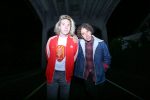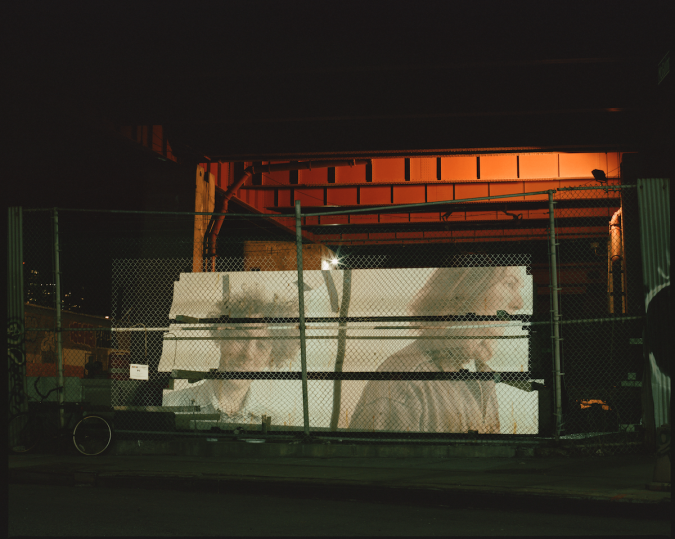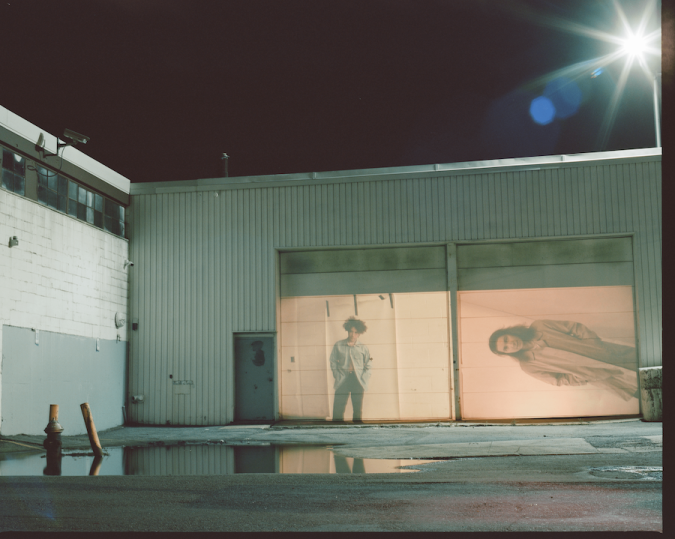Lewis Del Mar—that is, Danny Miller and Max Harwood—has come to some conclusions. In the wake of the explosive success of their 2016 full-length, major-label backed debut and a breakneck stretch of touring, the longtime friends knew something was off. Somewhere along the way they’d lost their grasp of the band’s spirit, of their partnership, of their own selves. “We began to feel like we were being marched down a path that wasn’t completely ours,” Miller says.
Yesterday, the duo returned—reorganized, reframed, refreshed. “The Ceiling” and “Border (Ch. III),” released simultaneously, mark the first two singles from Lewis Del Mar’s forthcoming sophomore album, August, slated for the release on the independent FADER Label in the eponymous month.
The emotional and mental attention Miller and Harwood paid to their own emotions and the state of their partnership over the course of recording—they started in September 2017 and finished up just as quarantine began in New York—is evident on both tracks. And neither song, nor the rest of the album, probably, would exist without having focused on their personal plights.
A lot can happen in four years, and it did, for both of them.

“The Ceiling” conveys part of that journey. At flurried punk pace, Danny sings, “Kicked in the door, who was the boy who walked out?” Though one might think being “glued to the floor, going in shock,” part of the next verse, might also have something to do with walking in on a partner in the act of cheating, but these are separate events. The former is actually about Miller blacking out when the band played Conan early in 2017.
They were particularly excited for the gig because a prior TV appearance, their first, didn’t go so well; Miller had smashed his guitar in a fit of anxiety. (That story is told on August, too.) He didn’t know it then, but the nausea and vomiting wreaking physical havoc on his body was not related to anxiety—he’d gotten food poisoning. So he smoked some weed, delivered to him by a friend who’s now the band’s manager, hoping to settle his stomach. Instead, he blacked out.
“I went onstage, and I don’t really remember any of it,” Miller admits. “all of these different things happening to me at once. I came back and Harwood said. ‘Wow, that was incredible.’ But my face was white, and we were walking out to the trailer. . . and i just passed out, fell on the ground.”
Cobbling together these seemingly disparate stories is a singular feeling, Harwood says: “A manic energy, of sort of a chaos.” He convinced a doubtful Miller the two events truly did belong in the same song.
There’s an order to August meant to mirror the duo’s evolution post-debut, time-capsuling a chronology that’s incredibly personal. Transparency is not new for Lewis Del Mar; the songs on their debut full-length and EP prior all stem from personal experiences, “or something tangential to that,” Miller says, be it the confrontational, beat-driven anthem like “Loud(y),” a trampoline in their career trajectory, or the mellower, rolling number “Wave(s)” situated alongside the former on their 2016 EP.
But from all that transpired between then and the beginning and end of recording August, Lewis Del Mar found a new route to getting personal by “connecting with a sensibility of the heart as opposed to a sensibility of the mind,” as Miller puts it.
While touring, Miller was coping with the bitter parts—the isolation wrought by the repeated “newness” from city to city, for one—by leaning into drugs and alcohol. “I sort of became a shell of a person,” he says. “My life was governed by fear and anxiety.” This understanding came in hindsight, though. “There was a period in this really wild summer that I don’t think we were fully aware of everything,” he says. “I think we still thought things were good.”
Post-tour, Harwood experienced a different kind of low. He wondered if it had all been for naught. “Business and creativity was coming to a full stagnation once everything sort of stopped,” he says. “This sounds worse than it is, but I guess it’s pretty bad, but…all this felt really hopeless. I didn’t see how any of this was going to work. At first, I was just letting it fall apart.” At this point, the two were torn apart, Miller says. It was retrospective reflection that helped them reconnect.

“Before, we were just trying to help this project,” he explains. “This shit’s a marriage, you know? They say about so many couples, they give a lot of resources to the kid and then the kid grows up and they’re like, fuck, am I even happy about this? Running this project and making music with Max since I was a young kid, it’s the same thing.”
Working on themselves individually, both of them now 30 years old, refortified their foundation, allowing them to return to songwriting. Understanding that, while they have moved forward, growth is a lifelong process, was also critical. “That first chapter [on the album] is definitely on the whole manic,” Harwood notes. “And that even extends into chapter two, but I think chapter two has a sort of reflection and a darkness to it.. And chapter three is a more hopeful reflection.”
“The Ceiling,” as one might guess, comes earlier. Yesterday second single, “Borders (Ch. III),” a languid confessional, naturally comes later. “It was written about a really difficult time that my father went through… that was a really difficult period of time for me.” Miller’s father lived with severe schizophrenia, and was hospitalized after suffering a stroke. “[He] needed medication. . . and he wasn’t being given access to that,’ he says. Miller’s father broke out of several hospitals and was missing for some time. “It caused a lot of heartbreak for everybody involved,” he says.
This was nine months after touring wrapped, Miller adds. His father passed near the end of the album-making process.

“The song is meditative, it’s reflective, it’s dense. But I’d like to imagine also that there’s this sort of glow to it that its hopeful, in a way,” Miller says. “Because that’s what undergirds that relationship with my father: A very. very deep love, above anything else.” The song lyrics poured out of Miller in just 10 minutes after landing in L.A., where the latter part of recording happened. “That’s what happens: You live with it in your heart for a long time, and then it just comes out.” he says.
Moving from one life stage to the next necessitates self-analyzation, and often that’s not possible while something’s holding you hostage. Miller sees now, having achieved some clarity about the period, that his heavy substance use had stunted all emotional maturation. “We very much still feel like we’re en route to where we’re supposed to be going, both as a partnership and a friendship, and as artists,” Miller says. “I feel like embracing that really changed everything.”
Miller describes the band’s realigned path as intentional: “We reorganized our team, we took back control of our master recordings, and we tried to create a space for ourselves that would allow us to develop in a sustainable and healthy way, the way we always wanted to develop,” he says. “We didn’t really have the experience to make the right decisions for ourselves the first time around.”
They’re both reaping the rewards of the difficult task of working on themselves and their partnership. August seems like it will convey the duo beginning that undertaking, however grim it may have been at certain times, and without a grand finale—because in personal growth, there isn’t one.
“It isn’t a pretty process.” Miller says. “But it was one of the more meaningful things that has happened in my life.”




